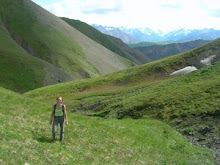I will not deny that there are aspects of my life that I partially appreciate simply in terms of their story potential. Maybe I'm wrong, but I feel like my life sometimes lends itself particularly well to this predilection; it's been a busy year. These stories aren't all serious or deep (despite what you might think from reading this blog sometimes), and it helps that I have almost no shame about telling my own stories to other people even if they don't reflect well on me--just ask me about my best drunken story sometime (it involves underwear), or about how at work one afternoon I advised an elderly woman to "not go home and stroke her succulent". But the point, at least for today, is that I suspect that this liking for a good story is part of why I began and have continued playing contemporary classical (or just plain "new") music. Simply put, it's just hard to resist an art form where I occasionally get to play a slide whistle and act all serious about it.
November was completely devoid of gigs for me, but December is, relatively speaking, packed full of concerts and rehearsals. The most personally exciting one, which got a really great review--they said we were disturbing! new music win!--is already over, and even before we started I was aware of its potential to be a "story" concert. One of the pieces I played involved all of the performers keeping track of their place in the music via individual stopwatches; we spent the first twenty minutes of our first rehearsal searching for blackberry stopwatch apps and setting our phones to airplane mode so as not to have the performance derailed by an untimely text message. Each "measure" was a different length, and each player was assigned one note per measure and told that we were also allowed to play pretty much whatever else we wanted as long as that particular note appeared in some sort of prominent way. We could also switch lines at will and play another part for a while, as the fancy struck us. It was basically long-form guided improvisation, which made me nervous (I'm such a stereotypically classically-trained player that the idea that I could do whatever I wanted was somewhat intimidating) but--as often happens with things that initially make me uncomfortable--it ended up being somewhat fascinating.
Here, for reference, are the program notes for the piece:
"The underlying theme...is that of inexorable forces (such as politics and plate tectonics) pulling people (and continents) apart, counterbalanced by a reciprocal yearning to keep pulling together, to strengthen community. The title [note: I'm leaving it out for google search purposes; read the review and figure it out] is an indication of the complexity of these relationships and of the strategies for addressing them: implicit, explicit, complicit, duplicity, multiplicity, implication, duplication, replication, etcetera. The score itself is a template for contingency, presenting the performers with recurrent windows of opportunity to assess and reassess their relationships with each other, shift allegiances, and to map out a course through changing sonic terrain."
So when I read that I'll admit I mentally snorted and thought something along the lines of "Plate tectonics? You want me to think about continental drift while I play? Mmmhmm..." Even when we were first playing through and I was beginning to see how we could work together, imitating sonic effects that we heard other performers initiate and slowly changing dynamics and intensity as a group without prior discussion, I only sort of got it. But during the composer's visit to our rehearsal he told us to think about birds and fish, how they change direction with no warning but in unison, how they function as a unit with no thought or leader or hesitation, and I felt a little click in my head, the lightbulb coming on. We didn't have a leader; theoretically we were playing at least three different pieces (plus video installation!) all at the same time, but together we formed a whole, an entire experience. We pushed and pulled on each other, tugged ourselves towards silence and cacophony (or "total freakout", as we usually refer to it in this group), imitated and diverged and formed something new every time we played. Sometimes it worked, sometimes it only sort of worked, sometimes it didn't really work at all; sort of like politics, yes? It was a slow and lengthy piece and I did, in fact, have time to think about landforms crumpling and rising and bumping into each other, the slow and inexorable process of change, and sometimes, for a minute or two I felt like a part of something larger. In other words, it might not be as funny as the slide whistle, but maybe it's a good story nonetheless.
Subscribe to:
Post Comments (Atom)







No comments:
Post a Comment